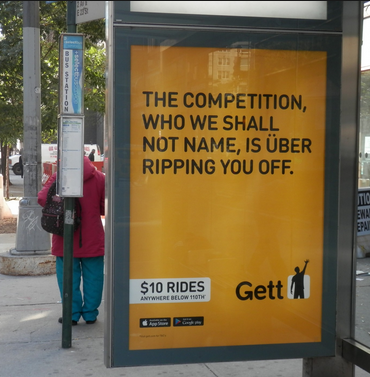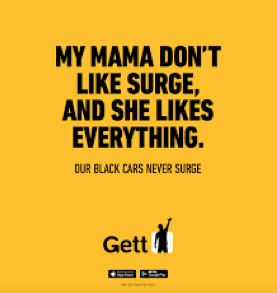No one is surprised to hear that the business environments in Israel are rather different than they are here in the states. Jokes can sometimes be cruder, you may have hookah smoke blown in your face, and you haven’t lived until the bus driver closes his door on you in the pouring rain because it took you too long to board the bus. My personal favorite, however, is when a taxi driver tells you that your own destination is wrong.
The advertisements in Israel, interestingly enough, sometimes follow the same pattern: they’re big, they’re loud, and they get up in your face until you get the message that there is in fact another pizza store opening in Jerusalem.
One example that comes to mind is Gett, a taxi-service app created in Israel. A fantastic idea, it connects taxis to taxi riders, and provides awesome solutions to transportation problems. You can’t find a cab in Israel without seeing the Gett tablet in the front seat, using Waze technology to tell you how far you are and how much it’ll cost.
When I got back this summer, I started noticing Gett ads in the subway. They’ve finally branched out from the Middle East into the big metropolis of New York City. Just by looking at the content of the ads not knowing anything else about the company, you’d know it’s Israeli. The ad campaign isn’t just hilarious, it’s also incredibly rude.
The advertisement campaign rips on the fact that Uber surges. It functions off putting Uber down. Gett entered the American battle of ride sharing with their Israeli chutzpah in a big way.
Ads are a voice for who you are and what you’re marketing. Gett brands itself as a functioning app that rarely surges, and that has room for all riders who need its services. By tackling Uber, it tries to brand itself as the new guy on the scene that’s ready for some competition. I’m intrigued by how they use popular songs, like they’ve done in the ad below, to make Uber seem unpopular, and generally not useful.

They’re also extremely catty. You can see that they love using passive comments that make someone chuckle, and instill a sense of hatred for Uber by a kind of repressed-rudeness that people love.
These advertisements speak to me. They make me laugh, and they make me want to use Gett all the time. Maybe we can all take some cues from Israeli advertisement traditions!

